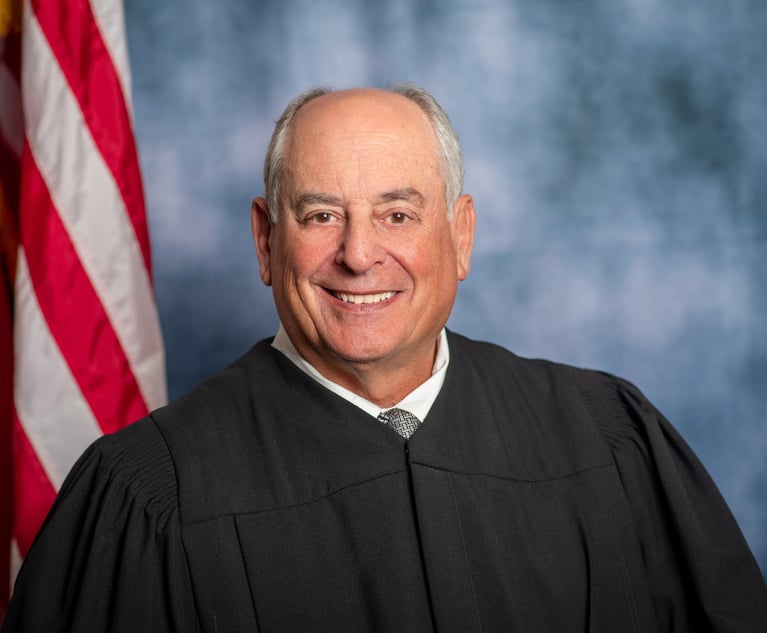 Judge Steve Jones, U.S. District Court for the Northern District of Georgia. (Photo: John Disney/ALM)
Judge Steve Jones, U.S. District Court for the Northern District of Georgia. (Photo: John Disney/ALM)Abortion Fight Escalates After Federal Judge Blocks Ban
Jones ruled that the law's potential consequences are unclear, open to prosecutorial discretion and therefore unconstitutionally vague.
October 02, 2019 at 06:23 PM
5 minute read
Both sides promised a fight to the finish after a federal judge temporarily blocked Georgia's law against abortion—with the envisioned finish line at the U.S. Supreme Court.
Of course, it was Supreme Court precedent that guided Judge Steve Jones of the U.S. District Court for the Northern District of Georgia to issue a preliminary injunction against House Bill 481. The bill outlaws abortion upon detection of an embryonic pulse. The statute says it could apply as early as six weeks into pregnancy and is effective Jan. 1, 2020.
SisterSong Women of Color Reproductive Justice Collective and other advocacy and medical care providers sued Georgia Gov. Brian Kemp, Attorney General Chris Carr and prosecutors, calling the law unconstitutional and seeking to block its enforcement. Jones gave them the injunction they requested Tuesday, saying they are likely to succeed in their pending constitutional challenge.
The order drew swift condemnation from the Family Policy Alliance, the public policy arm of the conservative religious group Focus on the Family, founded by author and broadcaster James Dobson. The group has backed similar laws around the country, calling them "heartbeat" bills. Half a dozen others have passed and been blocked by federal courts. Another new law this year—in Alabama—that bans all abortions outright with no exceptions has also been blocked. Supporters of the bans around the country have expressed the hope that one of them will make its way to the Supreme Court to challenge Roe v. Wade.
"This order will stop the state of Georgia from protecting preborn babies with heartbeats from the scourge of abortion. Family Policy Alliance of Georgia has supported the heartbeat bill from its inception and stands resolute in its fight to end abortion in Georgia," Family Policy Alliance of Georgia president and executive director Cole Muzio said in a news release. "Today's ruling is disappointing but, sadly, not unexpected. We have long known that the fight to end one of history's greatest injustices would be a long one, and we remain optimistically steadfast. Bad science, faulty precedent, and an illogical, radical agenda have, for too long, dictated that the preborn lack the most basic right to life. We look forward with great hope to that changing with the recognition of Georgia's right to protect its most vulnerable citizens."
Kemp signed the law into effect May 7, fulfilling a promise he made while campaigning for office last year.
"Despite today's outcome, we remain confident in our position," the governor's Deputy Executive Counsel Candice L. Broce said after the order came through. "We will continue to fight for the unborn and work to ensure that all Georgians have the opportunity to live, grow, and prosper."
That reference to all Georgians cues to a point of contention in the litigation: Exactly what is a Georgian? House Bill 481 redefines that, conferring the full status of a human being on the unborn at any stage of development. That includes tax deductions, child support and civil actions. Jones blocked those as well.
Supporters of the bill crafted the personhood definition to help overcome legal challenges to outlawing abortion. A debate has ensued since over how that will play out—whether women and their doctors can be prosecuted for abortions or even lifestyle choices that create risk for pregnancy.
Jones ruled that the law's potential consequences are unclear, open to prosecutorial discretion and therefore unconstitutionally vague.
After he'd already ruled that HB 481 is a "pre-viability abortion ban" that violates Supreme Court precedent in Roe and subsequent cases, Jones moved on to the personhood definition, calling it "a different yet equally concerning problem."
"This precise definition, however, was considered and rejected by the Supreme Court in Roe," Jones said. "Specifically, in Roe, the Supreme Court considered whether a 'person,' as used in the Fourteenth Amendment, includes an unborn child."
"The court noted that the Fourteenth Amendment speaks only of persons 'born or naturalized in the United States,' and that the use of the word has application only postnatally," Jones said. "Therefore, the court in Roe ultimately concluded that the word 'person' does not include the unborn and, thus, rejected the notion that an embryo/fetus is entitled to Fourteenth Amendment protection."
Susan Talcott Camp, deputy director of the ACLU's Reproductive Freedom Project, made the winning argument to Jones in a two-hour hearing Sept. 23. She represents SisterSong plus doctors, health care providers and patients across Georgia—as well as in other states.
"This is a victory for people in Georgia and a reminder that these attacks on abortion access are illegal," Camp said after Jones ruled. "Abortion is still legal in all 50 states. We won't stop fighting until we defeat all efforts to block access."
The case is SisterSong Women of Color Reproductive Justice Collective v. Kemp, Civil Action No.: 1:19-cv-02973-SCJ.
This content has been archived. It is available through our partners, LexisNexis® and Bloomberg Law.
To view this content, please continue to their sites.
Not a Lexis Subscriber?
Subscribe Now
Not a Bloomberg Law Subscriber?
Subscribe Now
NOT FOR REPRINT
© 2024 ALM Global, LLC, All Rights Reserved. Request academic re-use from www.copyright.com. All other uses, submit a request to [email protected]. For more information visit Asset & Logo Licensing.
You Might Like
View All
Georgia Supreme Court Honoring Troutman Pepper Partner, Former Chief Justice
2 minute read
'A 58-Year-Old Engine That Needs an Overhaul': Judge Wants Traffic Law Amended
3 minute read
Appeals Court Removes Fulton DA From Georgia Election Case Against Trump, Others
6 minute read
Family of 'Cop City' Activist Killed by Ga. Troopers Files Federal Lawsuit
5 minute readTrending Stories
- 1'Largest Retail Data Breach in History'? Hot Topic and Affiliated Brands Sued for Alleged Failure to Prevent Data Breach Linked to Snowflake Software
- 2Former President of New York State Bar, and the New York Bar Foundation, Dies As He Entered 70th Year as Attorney
- 3Legal Advocates in Uproar Upon Release of Footage Showing CO's Beat Black Inmate Before His Death
- 4Longtime Baker & Hostetler Partner, Former White House Counsel David Rivkin Dies at 68
- 5Court System Seeks Public Comment on E-Filing for Annual Report
Who Got The Work
Michael G. Bongiorno, Andrew Scott Dulberg and Elizabeth E. Driscoll from Wilmer Cutler Pickering Hale and Dorr have stepped in to represent Symbotic Inc., an A.I.-enabled technology platform that focuses on increasing supply chain efficiency, and other defendants in a pending shareholder derivative lawsuit. The case, filed Oct. 2 in Massachusetts District Court by the Brown Law Firm on behalf of Stephen Austen, accuses certain officers and directors of misleading investors in regard to Symbotic's potential for margin growth by failing to disclose that the company was not equipped to timely deploy its systems or manage expenses through project delays. The case, assigned to U.S. District Judge Nathaniel M. Gorton, is 1:24-cv-12522, Austen v. Cohen et al.
Who Got The Work
Edmund Polubinski and Marie Killmond of Davis Polk & Wardwell have entered appearances for data platform software development company MongoDB and other defendants in a pending shareholder derivative lawsuit. The action, filed Oct. 7 in New York Southern District Court by the Brown Law Firm, accuses the company's directors and/or officers of falsely expressing confidence in the company’s restructuring of its sales incentive plan and downplaying the severity of decreases in its upfront commitments. The case is 1:24-cv-07594, Roy v. Ittycheria et al.
Who Got The Work
Amy O. Bruchs and Kurt F. Ellison of Michael Best & Friedrich have entered appearances for Epic Systems Corp. in a pending employment discrimination lawsuit. The suit was filed Sept. 7 in Wisconsin Western District Court by Levine Eisberner LLC and Siri & Glimstad on behalf of a project manager who claims that he was wrongfully terminated after applying for a religious exemption to the defendant's COVID-19 vaccine mandate. The case, assigned to U.S. Magistrate Judge Anita Marie Boor, is 3:24-cv-00630, Secker, Nathan v. Epic Systems Corporation.
Who Got The Work
David X. Sullivan, Thomas J. Finn and Gregory A. Hall from McCarter & English have entered appearances for Sunrun Installation Services in a pending civil rights lawsuit. The complaint was filed Sept. 4 in Connecticut District Court by attorney Robert M. Berke on behalf of former employee George Edward Steins, who was arrested and charged with employing an unregistered home improvement salesperson. The complaint alleges that had Sunrun informed the Connecticut Department of Consumer Protection that the plaintiff's employment had ended in 2017 and that he no longer held Sunrun's home improvement contractor license, he would not have been hit with charges, which were dismissed in May 2024. The case, assigned to U.S. District Judge Jeffrey A. Meyer, is 3:24-cv-01423, Steins v. Sunrun, Inc. et al.
Who Got The Work
Greenberg Traurig shareholder Joshua L. Raskin has entered an appearance for boohoo.com UK Ltd. in a pending patent infringement lawsuit. The suit, filed Sept. 3 in Texas Eastern District Court by Rozier Hardt McDonough on behalf of Alto Dynamics, asserts five patents related to an online shopping platform. The case, assigned to U.S. District Judge Rodney Gilstrap, is 2:24-cv-00719, Alto Dynamics, LLC v. boohoo.com UK Limited.
Featured Firms
Law Offices of Gary Martin Hays & Associates, P.C.
(470) 294-1674
Law Offices of Mark E. Salomone
(857) 444-6468
Smith & Hassler
(713) 739-1250






